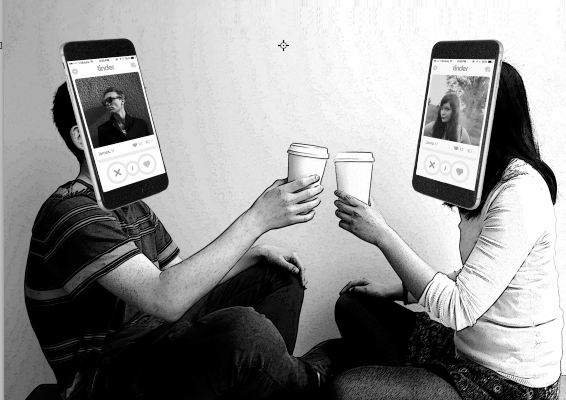Ron* quickly swipes left on Tinder, a cellular dating app that connects people who are nearby, as he gazes through photos of numerous girls in his area. A photo of a pretty girl surfaces on his screen, and he swipes right. In less than 10 minutes, Ron secures a coffee date with her. He calls himself “the Tinder King.”
So far, he has met two girls through Tinder. Users have the option to swipe right to like or left to pass, and if the other party likes them back, the “match” allows both parties to converse.
“You can see how far the person is, so the two people were about one mile away, which is the closest radius you can get,” Ron said. “I’m not trying to put in heavy work over Tinder.”
After looking at someone’s photos and their description, users can choose to “like” or “pass” them in the blink of an eye.
Tinder’s marketing slogan is “Tinder is how people meet. It’s like real life, but better.”
“People are time-deprived, careers have priority over relationships, not least because they are often a prerequisite to them, and the idea of a unique perfect match or soul-mate is a statistical impossibility,” said Tomas-Chamorro-Premuzic, professor of business psychology at University College London, in the Guardian on Feb. 17, 2014.
“What Tinder especially has accomplished, which I think none of our competitors could achieve before, is that it opened up this young demographic — 18- to 25-year-olds — that no product could open up before,” president of Match.com in North America Amarnath Thombre told New York Times Feb. 5.
People ages 18 to 24 make up 35 percent of Tinder’s demographic, which is the highest number out of all age groups, according to Facetets.com, a website with data-driven approach to application analytics.
School psychologist Luba Bek said Tinder is the latest incarnation of speed dating, a formalized matchmaking process that was first organized by Rabbi Yaccov Deyo of Aish HaTorah, in order to match Jewish singles for marriage.
The first speed-dating event happened seven miles away from Harvard-Westlake Upper School at Peet’s Coffee & Tea in Beverly Hills in 1998.
“Speed dating was one or two minutes to get to know each other and then move on, but for this generation, it has to be instantaneous dating because they have no patience for anything other than that, so [Tinder] serves the purpose,” Luba Bek said.
When setting up the app, users must connect their Facebook accounts in an effort to ensure veracity of users’ names, photos and ages.
Despite this precaution, many students still fear the dangers of meeting a random person online.
Jane*, who started using Tinder last year, matched with Clark*, who had mutual friends with her on Facebook. A conversation ensued between them, which eventually led to Clark realizing he went to the same high school as Jane’s cousin.
“We literally talked online for months, but it wasn’t that successful,” Jane said. “He was a really nice guy, but the only reason why I trusted him was because he and my cousin went to the same school.”
Many people use Tinder for finding hook-up partners, for dates or just for pure amusement. Some students such as Hannah Dains ’16, however, do not use Tinder seriously and have never met their matches in real life.
“I actually read an article—an experiment that a girl did where she put up pictures in different amounts of makeup and saw how guys responded to her,” Dains said. “So I started out by doing a similar thing where I changed my description every week and saw if people’s messages towards me changed at all.”
In the end, the results were the same no matter how much she changed her description.
“It seems like a fake way to meet people,” Tinder user Huey* said. “I have the same sentiment about online dating websites because it seems like just a replacement for traditional seeing-people-across-the-hallway-and-making-eyes-at-them.”
Jessica Dickman ’17 decided to write a script for the Playwrights Festival about two teenagers who fall in love on Tinder after being matched for three days.
“My screenplay is making fun of our generation and how kids actually do that,” Dickman said. “I’m definitely a user — I’m not going to lie — but not for serious reasons.”
However, Chamorro-Premuzic wrote on The Guardian that Tinder actually replicates the real dating world because physical attractiveness is one of the most prioritized determinants of infatuation.
Jessica Carbino, who received her doctorate at the UCLA on research on dating, discovered that, for example, clothing, the pucker of the lips or posture can reveal compatibility not only on a physical level, but also a social level.
Another study at Indiana University revealed that success on Tinder depended 72 percent on looks, 17 percent on a clever opening in the description and 11 percent on humor in the description.
“The first thing that attracts us, all research shows, is physical attraction, so Tinder is right on the spot.” Bek said. “It’s not the depths of personality. It’s not the sense of humor; it’s not the quirkiness. It’s not the similarities.”
For these reasons, students like Noah Gains ‘15 believe that the app omits the actual steps to feeling true love and is only for casual hook-ups.
“I think it takes away from the actual process of going out and meeting people,” Gains ’15 said.
Ron is now dating a girl that he did not meet via Tinder and acknowledges that one should never take the app seriously for love.
“Each relationship that you go through when you are an adolescent or even a pre-adolescent is like an exercise that can be good or bad, difficult or easy, which eventually develop your skills to become someone who is good at relationships,” Bek said. “If your exercise consists of swiping left or right, you don’t learn much. It’s like cheating in learning relationships.”
*Names have been changed

































